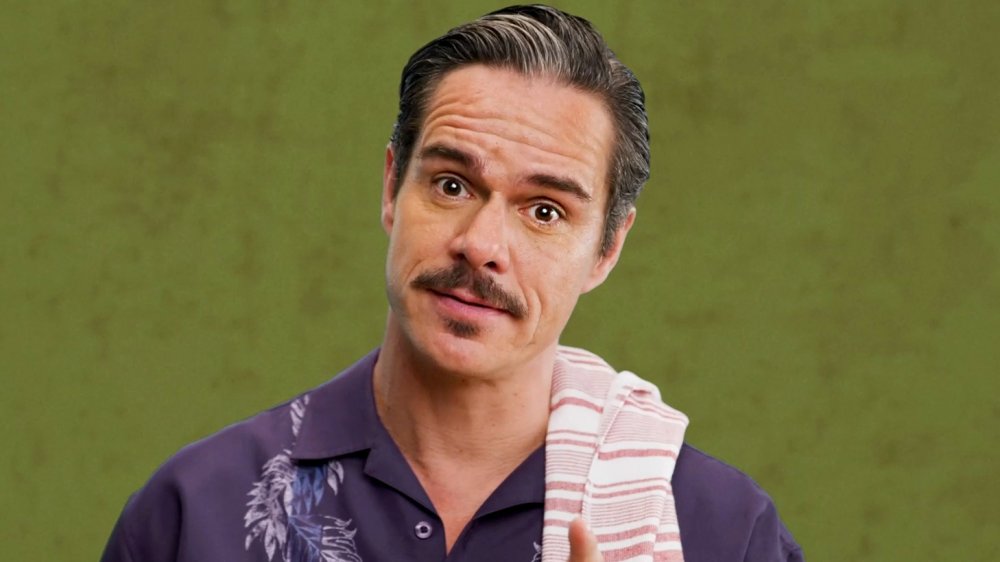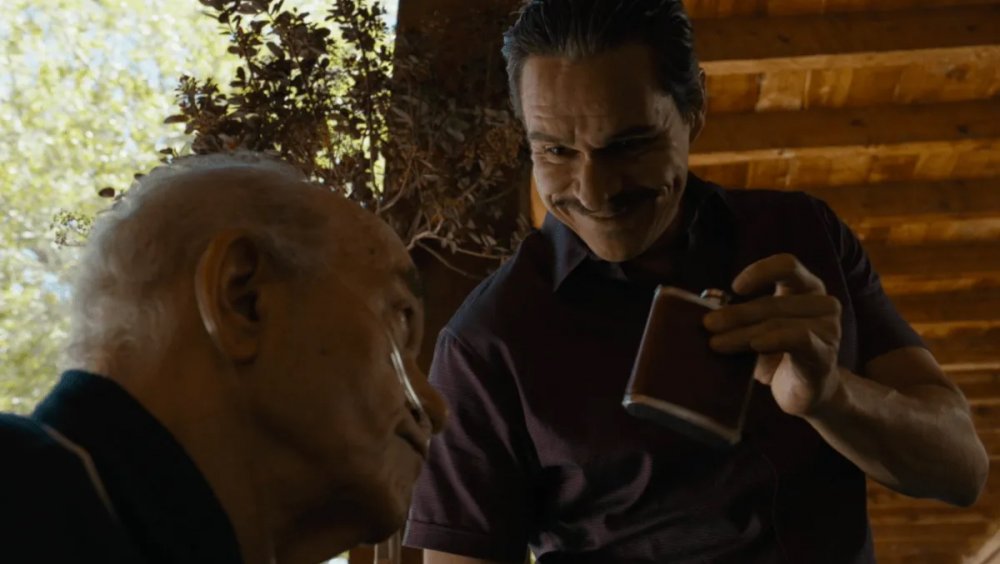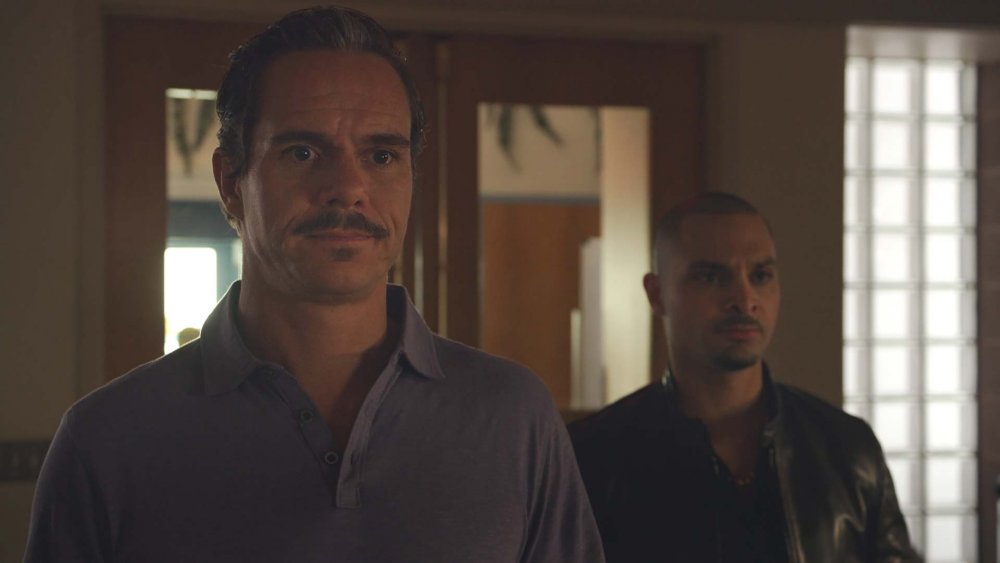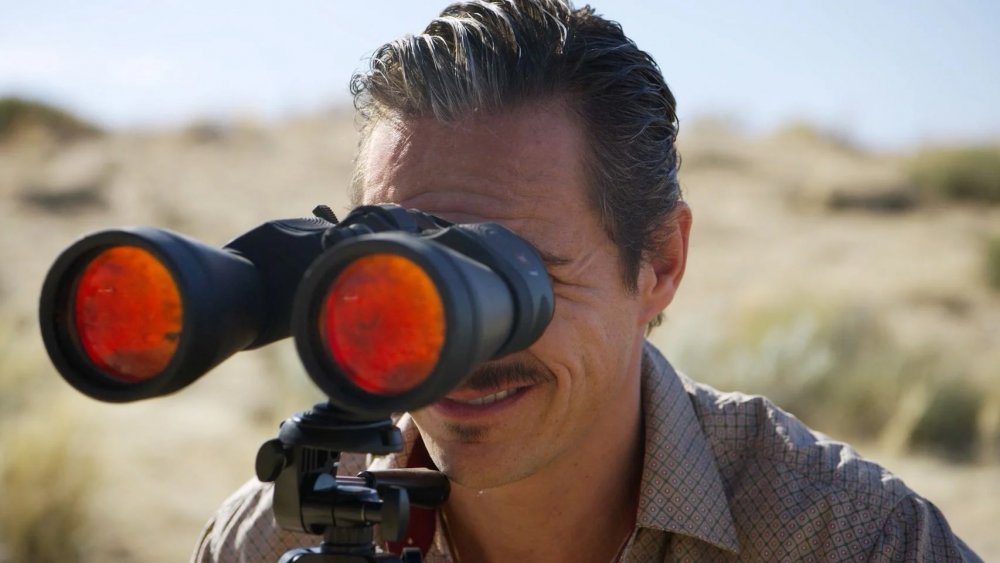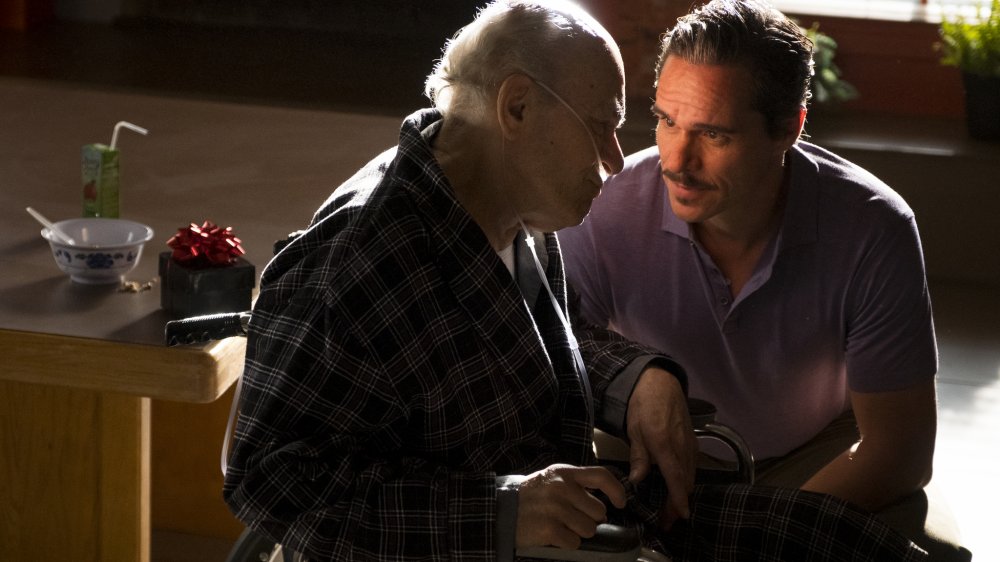Actor Tony Dalton Opens Up About Better Call Saul - Exclusive Interview
Now in its penultimate season, Better Call Saul is rocketing towards the finish line, but that doesn't mean Vince Gilligan and Peter Gould's Breaking Bad prequel has finished added new faces. For this season, veteran actor Tony Dalton, who plays the charismatic drug dealer Lalo Salamanca, was upped from a recurring character to part of the main cast. He's an excellent addition to the show, and seems dead set on making life difficult for Saul Goodman (Bob Odenkirk), Mike (Jonathan Banks), Gustavo Fring (Giancarlo Esposito), Nacho Varga (Michael Mando), and the rest.
At the beginning of Better Call Saul's fifth season, Dalton took some time from his busy schedule to talk with Looper about what it's like to shoot in Albuquerque, why Breaking Bad and Better Call Saul have such memorable villains, how Lalo got his signature smile, and what it's like being part the bigger Breaking Bad family. Here's what Dalton had to say.
Joining the Better Call Saul family
Were you familiar with Breaking Bad and Better Call Saul before you auditioned?
I was. Breaking Bad, I mean everybody in the world has seen that one. Better Call Saul, I'd seen a couple, I hadn't followed all of it, but I'd seen the first season, first and second. I obviously got right up to date after I got the part.
Many of your castmates have been living in this world for a decade. What's it like being the new kid on the block?
It's fun. Listen, everybody's so cool. Everybody's great. It's a really nice, tight, fun crew. Everybody's so nice to each other. I kind of just showed up there being sort of the outsider, because everybody already knew each other from, like you said, some 10 years ago and some just four or five years ago. Even Michael Mando and stuff who started just in Better Call Saul, but these guys have been going at it for a while.
Everybody was super friendly and the crew is unbelievable. I think you've heard that before, everybody says it, but listen, I've been working in this business for a long time, for 20 years, and I've never worked with a crew that's this cool and this great.
Sometimes you go over a couple of hours from work, over the time that it's supposed to be and usually, in other crews, you start seeing people getting a little upset about the fact that it's over time or something. Here, everybody understands that it's part of the job, because it happens all the time. That kind of attitude like, "It's okay, we're all working. We're doing something great and when this is over, we're all going to miss it."
You may not be that familiar to American viewers, but you've been in a number of really high-profile Mexican and Spanish-language productions. How has your past work prepared you for your time as Lalo?
Well, I think that all your work kind of just prepares you for the next one. Just doing so much work, it takes the fear away. It makes you a little braver in exploring your character and doing things that maybe you wouldn't do before.
For example, in the case of Lalo, he was never going to be that charming. I saw Breaking Bad and I saw Better Call Saul before I got the job and I thought there needs to be somebody besides Bob, besides Jimmy, who also is kind of smiling and carefree and kind of a little bit, sort of a conman, mischievous kind of thing and in the bad guy's part. So that's kind of what, what we tried to do there with that.
It was Peter [Gould] and Vince [Gilligan] that had the guy... the first time you meet him, he was cooking, and he was sort of telling them that he's only going to be there for a while. There wasn't that much charm. That's something that, if I hadn't had so many years of work, I don't think I would've had the courage to just go and do that, especially with these guys, but it ended up being something that really helped the character and helped the story just be better.
You mentioned the cooking. Do you cook much yourself?
Yeah, I do. I cook every day.
What it's like to break bad
You play a lot of criminals. Is there something that draws you to less savory characters?
No. Most of the roles down here [in Mexico] are like that. The only good guys are the telenovela stars. If you're going to play an interesting character, for example, the HBO thing, I did Sr. Avila, he was the lead. There was no "good guy." He was the guy. Yeah, he was a criminal, it was a little more than just a criminal. He's a family guy and sort of this and that. I think that happens with a lot of characters, even in the States. They have this sort of this antihero-type thing.
That's sort of what I've been called to do. Parts are offered. It's not so much a choice that an actor can make. They call you. It's not like you go, "Well, I want to be in Wolf of Wall Street now," and Martin Scorsese's like, "Yeah, well." They call you and you read it. I've said no to a lot of bad guys, and I've also said no to a lot of good guys, because they're just kind of boring sometimes.
From your perspective, is there a secret to playing a good bad guy?
No. To begin with, I would never judge them as good or bad. I think that you have to sort of emphasize with the part that you're playing, no matter how bad or how good or whatever it is, you have to find all the different parts of that character that you like and you dislike sort of to be able to portray him in the most honest way. You can't judge him in a bad way or in a good way. You just got to go with him.
Better Call Saul and Breaking Bad are kind of famous for having memorable villains.
Yeah, exactly. It's one bad guy over another bad guy. They're all bad guys. Even Saul is a bad guy.
Oh, yeah, he's terrible! Why do you think makes co-creators Vince Gilligan and Peter Gould and the rest of the writers so good at kind of creating these awful people?
I don't know man, but they're really good. They know their stuff good. They're just amazing writers. They have it so clear where they're going and what the secret is and where the characters are going, where the story is going and what the tone and the genre is, because it's a tricky line between being this offbeat drama-comedy and this dark drama. In Breaking Bad, it goes dark really fast, but Better Call Saul still has sort of these touches of lightness. It's not some guy who's saving the world and he's got so much time to save the world. It's just a lawyer having some hard times and you kind of like him and then stuff gets real.
This season, Lalo is head-to-head against Giancarlo Esposito's Gustavo Fring, who's one of the biggest villains, if not the biggest villain, in Breaking Bad history. Can you talk a little bit about what it's like working with Giancarlo?
Yeah, Giancarlo's amazing. He's such a wonderful actor and he's so generous. He's such a great guy in the real world. He's very fun to be around and he's very noble and he's very much into yoga and he's very spiritual. It's very opposite to playing this very serious sort of Latino villain. He's been around for a while. The guy's been an actor since he was a kid, so talk about somebody who knows their craft.
I was a fan of Giancarlo since The Usual Suspects, so it's great to work with him. Jonathan Banks too. Banks and I have become good friends. He's a great guy. You're in Albuquerque for five months, four months, and you're kind of stuck there, so you get to hang out with these guys a lot and that they're really great human beings. All of them are. Rhea [Seehorn] and Bob [Odenkirk] and Michael [Mando]. It's just a great crew to be around.
Death is never more than one script away
Was there a particular moment during shooting where you were like, "Oh, I get Lalo now?" Something that crystallized the character for you?
Well, I think that it just happens more and more every time. I think that one of the great things about Pete and Vince and all the writers is that it's sort of this living, breathing organism. They don't have the story set in stone, they just kind of go with what they start seeing that works.
You'll see the things that start happening in the story. There are just so many little tiny things that are written that are like, "Oh yeah, that's very Lalo-ish." Then I'll start doing things and Vince will go, "Do that. Do that more. Let's do that with your hand all the time." So, he starts sort of creating this character there, that just starts getting more profound. Then he's not just a smiley guy all the time. He's a guy that's kind of scary.
Do have a lot of room to kind of give input into your character like that?
Not really. They're very well written. They run a tight ship as far as you can't just start saying whatever you want, but what they do is that when they see something that works, they go with it.
I think that's something that happened with Lalo. I'm not sure, but I've heard that he wasn't supposed to be in the whole thing, and it just started working better and they said, "No, no, no, this is our guy. Let's keep it going." So, it's sort of like, you go out there, you start doing some things that you think are better, you start to say let's try this or that and they said, "Yeah, that works." Then, all of a sudden, they fall in love with the character and just kind of go with it.
Do they let you know what Lalo's story's going to be very far in advance?
God, I wish. They don't let me know even when you're reading the episodes. It's like, "What?" What happens in the last episodes of this season, I was like, I just started jumping up and down in my sofa, in my apartment in Albuquerque. I was like, "This is out of control." They go way over the line on this one. It's a set up for the end. Amazing.
And you don't know if you're going to get killed. I'll go have dinner or lunch or something with Rhea, and she's like, "They told me that they're going to let me know a couple of days before I get the script so that I'm not reading it and get killed, but so far so good."
I kind of think it's funny because Banks he comes up to me, he's like, "Hey kid, don't get mad if I have to kill you. You know?" So, he didn't know that I had become a series regular. I was like, "Yeah, okay." And the next time, "So far, so good. You're not going to die." Then finally he came up to me, he goes, "So you're a series regular, kid." I was like, "Yeah." "Why didn't you tell me? I thought I was going to kill you." Screwing around with me is all.
What kind of prep do you do before you shoot?
Well, I've always kind of done the same kind of prep. You got to start with how he talks, how he walks and start seeing other maybe characters or people that he could be similar to. For example, one of the things that I pride myself on is I think Lalo is very similar to Jules Winnfield, which is Samuel L. Jackson's character in Pulp Fiction. Kind of this smart ass, sort of scary but kind of carefree, kind of cool guy.
That's one tiny little thing that you grab. Also, I have a friend down here in Mexico who's just the most charming guy in the world, so I kind of grab a little bit of him, and then the stuff that's written and then how he walks and how he kind of bends over, You start doing all that stuff for a while at home like a crazy person and then you got to go show up on the set and you kind of got it.
Is there anything about your work on Better Call Saul that you're particularly proud of?
Well, all of it. It's my work. I'm proud of everything that I do. There's not one thing that I would choose over the other. It's all very studied. It's not random. I take it very seriously. I work on it hard to make sure that the character is as far off away from me, but also, very true to the story and true to itself. So, I wouldn't know how to pick one single thing because there's just so many things that entail the wholeness of Lalo.
Good secrets are worth keeping
Do you like shooting in Albuquerque?
I love it. I love it. I think it's great. To begin with, just going somewhere that's so random. You know what I mean? In my wildest dreams, I never would have thought that I'd be living in the desert for a while, in the United States especially, but it's great. There's lots of stuff to do there. It's a great town, Albuquerque, and it's got a niche too. That whole Breaking Bad storyline, it's true. There are some shady characters in the downtown area. You got to watch out.
I actually got my car broken into, all my passports stolen and I wasn't in the episode and I couldn't leave. I could maybe get to Mexico, but I was scared that I wouldn't be able to get back to the States. So, I was like, "You know what? I'm just kind of hanging out here, because I don't want to get fired." So, I stayed there for a month without working and that was interesting, because you hang out with Banks a lot and stuff, then you go on hikes every day. You get to really know the town as you drive around, go see the Tent Rocks and all of these different places. There's so much to see around that area. It's wonderful, really.
Is there a lot of secrecy on the set trying to keep all these plot twists secret?
There is secrecy, but it's sort of like a speakeasy. It's known, but nobody really mentions it. It's just like, you can't say anything. If you ask me what's going to happen, I go, "I can't say anything." You can't put up a picture of a set period, and I understand that and I respect it because part of the secrecy is part of what makes it so great.
Even with El Camino, when we were there, everybody had already shot the movie, but nobody talked about it because nobody was supposed to know that it has been shot yet, and they can take, kept a pretty tight ship about it until a couple of weeks before it came out. Nobody really even knew that it was filmed.
So, you knew that El Camino had been filmed before the rest of us?
Yeah, because I was on the set. So, the whole crew is the same crew because they've been there already for four months before, and they're like, "No, we did the Breaking Bad movie." It wasn't like, "Oh my God, I'm going to tell everybody." It's something you know and you just keep your mouth shut.
